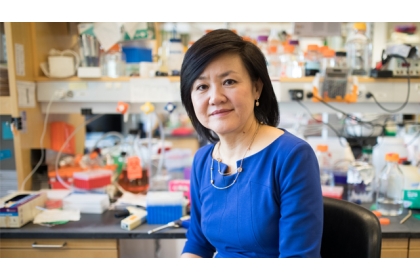MIT Scholar and NCHU Alumnus Li-Huei Tsai Discovers a New Way to Reverse Alzheimer's Disease
2023-06-14
興新聞張貼者
Unit秘書室
2,890
Li-Huei Tsai, a scholar at Massachusetts Institute of Technology (MIT) and an alumnus of the Department of Veterinary Medicine, National Chung Hsing University, is an expert in the field of brain research. Recently, Tsai’s team published thier breakthrough study in the "Proceedings of the National Academy of Sciences of the United States of America (PNAS)" to disclose their discovery of a new way to "reverse" Alzheimer's disease. It has aroused great concern in the international academic circles, and American academic circles even believe that Li-Huei Tsai has the potential to be nominated for the Nobel Prize in the future.
Li-Huei Tsai is currently a professor of the Department of Brain and Cognitive Sciences at Massachusetts Institute of Technology and an academician of the United States National Academy of Sciences. She was elected in 2008 as the highest-voted and youngest female academician of the Academia Sinica, Taiwan of all time. Her main research areas include neuropsychiatric disorders, autism and Alzheimer's disease. Li-Huei Tsai graduated from the Department of Veterinary Medicine, NCHU in 1982, and then was conferred a Master's Degree in Molecular Biology from the University of Wisconsin. In 1990, she was awarded a Ph.D. Degree in Virology from the University of Texas Southwestern Medical Center. In 2007, she won the Distinguished Alumni Award of National Chung Hsing University.
This time Academician Tsai published a major research. Teachers and students of National Chung Hsing University are very excited and encouraged. President Fuh-Sheng Shieu will also send a letter to express his congratulations, and invite Academician Tsai to return to Taiwan to give a keynote speech at her alma mater in the future. As President Shieu said, Taiwan's higher education is absolutely capable of cultivating excellent forward-looking research talents.
Li-Huei Tsai's team used peptide to interfere with the enzymes that are normally overactive in the brains of patients with Alzheimer's disease. The peptide compound stops the CDK5 enzyme from becoming overactive so as to prevent nerves damages which lead to cognitive decline. Li-Huei Tsai said, "The effect of this peptide is very significant. We have seen miraculous effects in reducing nerve tissue degeneration and neuroinflammation, and even rescuing behavioral defects." After further experiments, the researchers are optimistic that this peptide can eventually be used to treat patients with Alzheimer's disease and other types of dementia.
Related link: A new peptide may hold potential as an Alzheimer’s treatment
Li-Huei Tsai is currently a professor of the Department of Brain and Cognitive Sciences at Massachusetts Institute of Technology and an academician of the United States National Academy of Sciences. She was elected in 2008 as the highest-voted and youngest female academician of the Academia Sinica, Taiwan of all time. Her main research areas include neuropsychiatric disorders, autism and Alzheimer's disease. Li-Huei Tsai graduated from the Department of Veterinary Medicine, NCHU in 1982, and then was conferred a Master's Degree in Molecular Biology from the University of Wisconsin. In 1990, she was awarded a Ph.D. Degree in Virology from the University of Texas Southwestern Medical Center. In 2007, she won the Distinguished Alumni Award of National Chung Hsing University.
This time Academician Tsai published a major research. Teachers and students of National Chung Hsing University are very excited and encouraged. President Fuh-Sheng Shieu will also send a letter to express his congratulations, and invite Academician Tsai to return to Taiwan to give a keynote speech at her alma mater in the future. As President Shieu said, Taiwan's higher education is absolutely capable of cultivating excellent forward-looking research talents.
Li-Huei Tsai's team used peptide to interfere with the enzymes that are normally overactive in the brains of patients with Alzheimer's disease. The peptide compound stops the CDK5 enzyme from becoming overactive so as to prevent nerves damages which lead to cognitive decline. Li-Huei Tsai said, "The effect of this peptide is very significant. We have seen miraculous effects in reducing nerve tissue degeneration and neuroinflammation, and even rescuing behavioral defects." After further experiments, the researchers are optimistic that this peptide can eventually be used to treat patients with Alzheimer's disease and other types of dementia.
Related link: A new peptide may hold potential as an Alzheimer’s treatment


